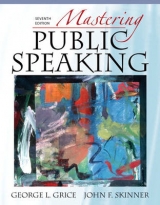
Mastering Public Speaking, ActiveBook Edition (with MySpeechLab , Pegaus 2009)
Pearson (Hersteller)
978-0-205-59437-5 (ISBN)
- Titel erscheint in neuer Auflage
- Artikel merken
Grice & Skinner, Mastering Public Speaking 6e, in brief:
Mastering Public Speaking equips readers with a firm grounding in the “hows” and “whys” of public speaking by providing an ideal balance of theory and skills while placing important emphases on critiquing, ethics, and critical thinking. Written in a casual, lively style and clearly organized, this sixth retains its popular and distinctive emphasis on the ethical contract between speaker and listener and on the value of critiquing speeches to improve one's own skills. Readers learn how to think critically as they choose speech topics, conduct research, organize content, select language, manage nervousness, and deliver speeches.
See Grice & Skinner’s Mastering Public Speaking 6e for a complete description of the text.
1. An Introduction to Public Speaking.
Why Study Public Speaking?
Definitions of Communication.
Levels of Communication.
Elements of Communication.
The Public Speaker as Critical Thinker.
Summary
Exercises
2. The Ethics of Public Speaking.
Definition of Ethics.
Principles of Ethics.
Ethical Speaking.
Ethical Listening.
Fair Use Guidelines.
Plagiarism.
Summary
Exercises
3. Speaking Confidently.
Recognize That Speaker Nervousness Is Normal.
Control Speaker Nervousness.
Learn How to Build Speaker Confidence.
Prepare Your First Speech.
Summary
Exercises
4. Responding to Speeches.
The Importance of Listening.
Listening vs. Hearing.
The Process of Listening.
Obstacles to Effective Listening.
Promoting Better Listening.
Critiquing Speeches.
Acting on Criticism.
Summary
Exercises
5. Analyzing Your Audience.
Recognize the Value of Audience Diversity.
Analyze Your Audience Before the Speech.
Analyze Your Audience during the Speech.
Analyze Your Audience after the Speech
Summary
Practice Critique: Evaluating a Speaker’s Audience Analysis
Exercises
6. Selecting Your Speech Topic.
Generate Ideas.
Focus Your Topic.
Determine Your General Purpose.
Formulate Your Specific Purpose.
Word Your Thesis Statement.
Develop Your Speech Title.
Summary
Practice Critique: Evaluating Titles
Exercises
7. Researching Your Topic.
Assess Your Personal Knowledge
Develop Your Research Plan
Collect Your Information
Record Your Information
Conclude Your Search
Summary
Practice Critique: Evaluating Research
Exercises
8. Supporting Your Speech.
Purposes of Supporting Materials.
Types of Supporting Materials.
Tests of Evidence.
Evaluating Electronic Information.
Citing Your Sources.
Summary
Practice Critique: Evaluating Evidence
Exercises
9. Organizing the Body of Your Speech.
Formulate an Organizing Question.
Divide the Speech into Key Ideas.
Develop the Key Ideas.
Connect the Key Ideas.
Summary
Practice Critique: Evaluating Organization
Exercises
10. Introducing and Concluding Your Speech.
Organize the Introduction of the Speech.
Organize the Conclusion of the Speech.
Summary
Practice Critique: Evaluating Introductions
Exercises
11. Outlining Your Speech.
Functions of Outlining.
Principles of Outlining.
Stages of Outlining.
Summary
Practice Critique: Evaluating a Speech Outline
Exercises
12. Wording Your Speech.
Functions of Language.
Principles of Effective Language Use.
Summary
Practice Critique: Analyzing Language Use in a Powerful Speech
Exercises
13. Delivering Your Speech.
Principles of Nonverbal Communication.
Methods of Delivery.
Qualities of Effective Delivery.
Elements of Vocal Delivery.
Elements of Physical Delivery.
Summary
Practice Critique: Pairing Gestures and Movements with Words
Exercises
14. Using Presentational Aids.
The Importance of Using Presentational Aids.
Types of Presentational Aids.
Strategies for Using Presentational Aids.
Summary
Practice Critique: Evaluating Presentational Aids
Exercises
15. Speaking to Inform.
Characteristics of a Speech to Inform.
Informative Speech Topics.
Guidelines for Speaking to Inform.
Annotated Sample Speech: The Amish: Seeking to Lose the Self.
Summary
Practice Critique: Evaluating and Comparing Two Informative Student Speeches
Exercises
16. The Strategy of Persuasion.
The Importance of Persuasion.
A Definition of Persuasion.
Types of Influence.
Types of Persuasive Speeches.
Persuasive Speaking Strategies.
Summary
Practice Critique: Analyzing Persuasive Appeals in a Powerful Speech
Exercises
17. The Structure of Persuasion.
Making and Refuting Arguments
Types of Argument
Fallacies of Argument.
Selecting Propositions for Persuasive Speeches.
Monroe's Motivated Sequence.
Annotated Sample Speech: Diploma Mills.
Summary
Practice Critique: Identifying a Claim and Evaluating Evidence
Exercises
18. Speaking on Special Occasions.
The Speech of Introduction.
The Speech of Presentation.
The Acceptance Speech.
The Speech of Tribute.
The Speech to Entertain.
The Impromptu Speech.
The Question-Answer Period.
The Videotaped Speech.
Summary
Practice Critique: Evaluating a Speech of Tribute
Exercises
19. Speaking in and as a Group.
Small Group Communication and Public Speaking.
Small Groups Defined.
Types of Groups.
Group Discussion and Decision Making.
The Group Presentation.
Summary
Practice Critique: Analyzing a Group’s Interactions
Exercises
Appendix: Sample Speeches.
Renaissance Fairs, Melissa Janoske
Critique of Renaissance Fairs, Donika K. Patel
Steganography, Tiffanie K. Petrin
A Sign of the Times, Jared J. Johnston
How Old Is He Anyway? Aging the Whitetail Buck, Darla Goodrich
Persuasive Speech, Gene Fox
Speech of Tribute, Edwin C. Anderson, Jr.
I Have a Dream, Martin Luther King Jr.
| Erscheint lt. Verlag | 13.3.2008 |
|---|---|
| Sprache | englisch |
| Gewicht | 885 g |
| Themenwelt | Sachbuch/Ratgeber ► Beruf / Finanzen / Recht / Wirtschaft ► Briefe / Präsentation / Rhetorik |
| ISBN-10 | 0-205-59437-9 / 0205594379 |
| ISBN-13 | 978-0-205-59437-5 / 9780205594375 |
| Zustand | Neuware |
| Haben Sie eine Frage zum Produkt? |
